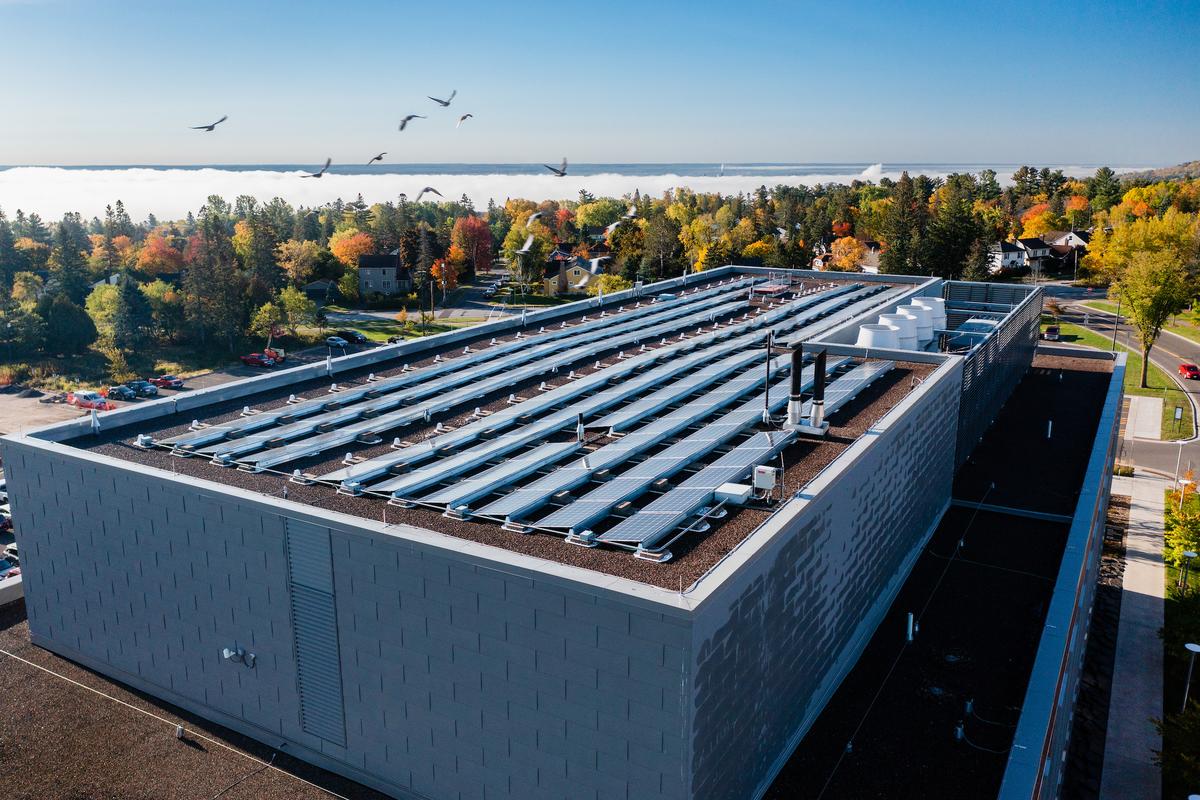The University of Minnesota’s Institute on the Environment (IonE) is a connector and catalyst for projects that advance climate and broader sustainability solutions in Minnesota, the Midwest, and around the world with Minnesota-grown innovation being a crucial element.
Through its Impact Goals grantmaking program, IonE has supported dozens of high-impact projects that combine the expertise of UMN faculty, researchers, staff, and community partners – distributing more than $2.2 million in funding to 30 projects since launching the grants in 2019.
The Institute has announced the awarding of another $1.9 million to 12 new projects for 2024. Earning one of the grants is the interdisciplinary team of the BBER, UMD, City of Duluth, and Minnesota Power on the project of Investigating the Potential Demand for Distributed Rooftop Solar Energy Production on Commercial Properties in the Greater Duluth, Minnesota, Area.
Project synopsis
With the rapidly declining price of solar and numerous incentive and support programs available for businesses, it is notable that solar capacity from commercial sources statewide was only about 150 of the 1,500 megawatts of total solar capacity in Minnesota in 2022 (Minnesota Department of Commerce, 2024). Yet, according to the Regional Indicators Initiative, heating and powering commercial buildings was the largest source of greenhouse gas emissions in many cities including Duluth, Rochester, St. Paul and Minneapolis.
- This project team seeks to estimate the conditions necessary to incentivize commercial property owners in Duluth, Minnesota to install distributed rooftop solar. The project will use voluntary survey methods to:
- Identify the barriers and economic preferences of commercial property owners as they relate to commercial rooftop solar installations.
Determine whether renters in commercial buildings consider renewable energy production as a factor in determining their business’s location and their total willingness to pay on rental expenses.
Commercial property owners that complete the survey, and opt-in, will be provided with a customized portfolio that will evaluate their rooftop solar potential using a combination of energy consumption/benchmarking data, survey responses, and a solar suitability assessment. Additionally, the project team will widely disseminate its processes and results, benefiting multiple stakeholders.
Project team
- Principal investigator: Monica Haynes, M.S.; Director, Bureau of Business and Economic Research, UMN-Duluth
- Chris McIntosh, Ph.D.; Associate Professor of Economics, Department of Economics and Health Care Management, UMN-Duluth
- Neil A. Wilmot, Ph.D.; Associate Professor of Economics, Department of Economics and Health Care Management, UMN-Duluth
- Alison Hoxie, Ph.D.; Associate Professor, Mechanical and Industrial Engineering Department, UMN-Duluth
- Mindy Granley; Sustainability Officer, City of Duluth
- Brett Crecelius; Community Resilience Project Coordinator, City of Duluth
- Katie Frye; Supervisor, Customer Programs and Services, Minnesota Power.
IonE award-winning projects have community partners representing nearly 30 organizations, on topics ranging from the combination of solar and agriculture to maximize social benefit to survey methods to build public trust and understanding for the management of some of Minnesota’s most culturally significant wildlife. Additional projects include innovative applications of biochar to extract heavy metals from polluted waterways, and advancing the use of robots to monitor and inform strategies for the management of aquatic invasive species in the Great Lakes.
This diversity of projects is the result of an expanded call for proposals. In line with its new strategic plan, IonE broadened its investment areas beginning with this grant cycle – from three goal areas to ten topical domains, including biodiversity, adaptation, and environmental justice. This expansion allows for a more dynamic, diversified portfolio of work, and better reflects the range and depth of knowledge among the University community and project partners. Each team must include significant community partnerships, and core to IonE’s evolved grantmaking philosophy is having the project teams – those who are closest to the challenges at hand – be the ones who define meaningful impact.
“The funding and support provided through IonE’s Impact Goals program unlocks innovation and elevates the kind of interdisciplinary, community-engaged, projects needed to lay a path to a more sustainable future,” says IonE Executive Director Jessica Hellman, “This year’s expanded investment areas reflect our growing contribution to global-leading climate and environmental research.”
Funding for Impact Goals grants come from a variety of sources, including IonE’s resources; investments in sustainability via the University’s strategic plan (Mpact 2025, MNtersections); and the MnDRIVE Environment initiative. This year’s disbursement of over $1.9 million is the largest granting cycle to date.
